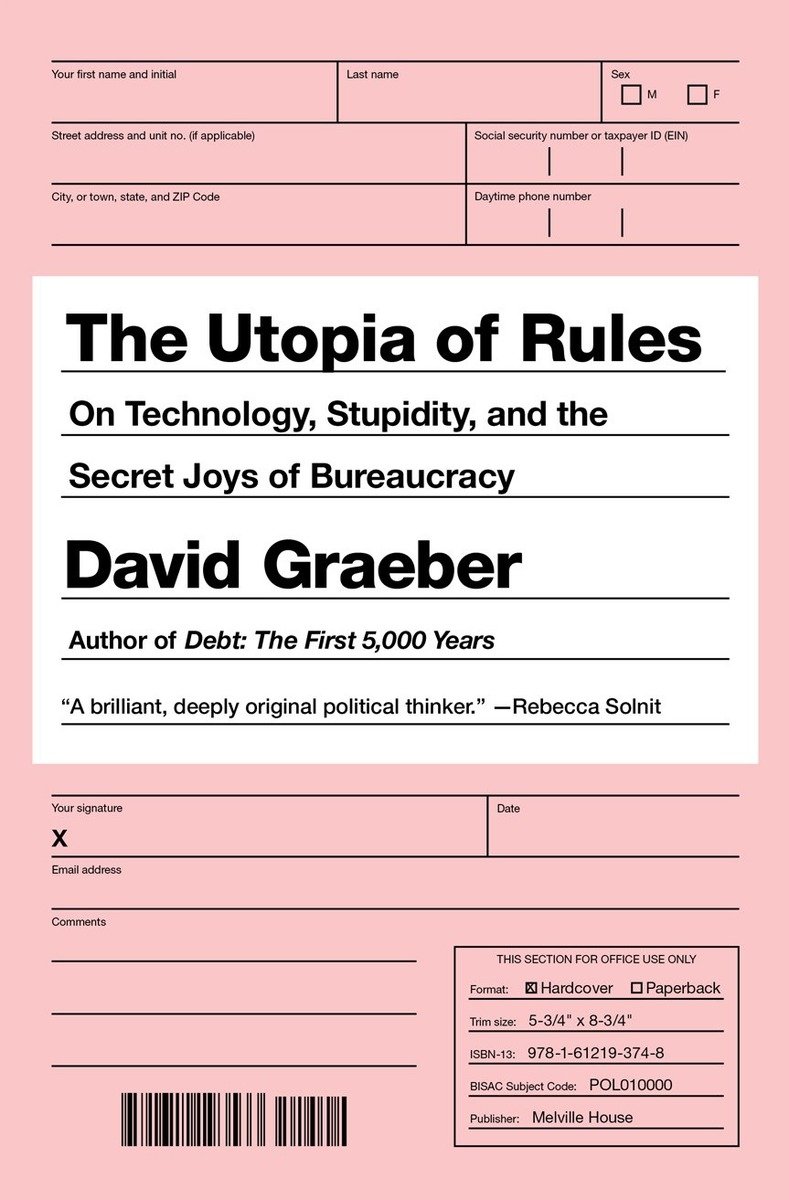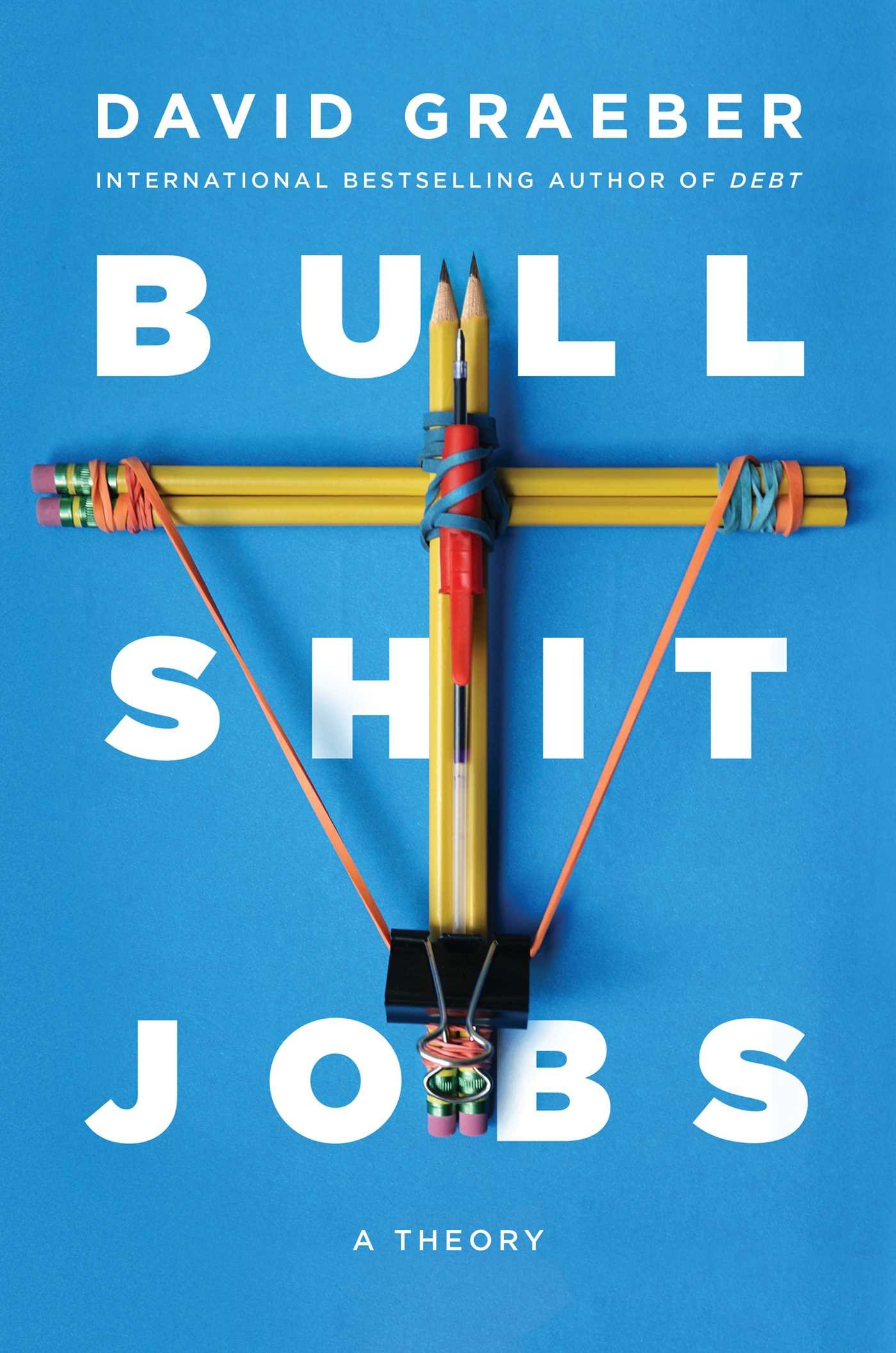
Interview by David Whelan (vice.com) about bullshit jobs
10 Feb 2015
Anthropologist David Graeber Explains Why Dead-End Jobs Exist.
David Whelan interviewed David Graeber about his book, ‘The Utopia of Rules’, useless jobs, the rules we live by, and why Christopher Nolan’s Batman is just a big fat bureaucrat in a cape.
The problem with people’s jobs is that clerical administrative work has reached an insane 75% of total employment. It is a hyper-fetishism of paperwork. The next problem is this weird logic that the more unpleasant the work, the more redemptive it is. The unemployed keep all those people who won’t employ them employed, by running around applying for jobs, filling out paperwork, registering on websites, and taking phone calls. Bureaucracy provides an illusion of fairness.
If you’ve ever spent 15 minutes listening to the same U2 song while on hold to your mobile-phone provider because the 27 people you’ve spoken to so far have no idea who the hell you are, you’ll know all about the throb in the ass that is bureaucracy. Our lives fundamentally suck because of it.
David Graeber—the anthropologist who wrote the international best seller Debt: The First 5,000 years (a book Russell Brand says will “make you cleverer”)—argues in his new book, The Utopia of Rules, that we’re trapped in jobs created by the ruling classes to feed into their debt-extraction schemes. In other words, we’re working dead-end bullshit jobs so that we can be mined for profit. We are the sticky side of the red tape.
Bureaucracy is like society’s guiding spirit, except it’s more of a Ray Winstone–like figure than Jiminy Cricket. It doesn’t always have our best interests at heart. In The Utopia of Rules, Graeber makes compelling, complex arguments about how, beneath its single-mindedness, bureaucracy is metastatic, that it’s founded on the threat of force. Refuse to play ball with the police officers, tax auditors, or any other official who supports the big government system of spying and threatening, and basically you’ll have the shit kicked out of you—either literally, in the case of armed bureaucrats (a.k.a. the police), or with a crippling fine. Every time you try to escape bureaucracy, it finds you.
Living in a Western capitalist state means spending more of our lives filling out paperwork, re-submitting internet forms, and waiting on hold listening to Bono wailing than our grandparents ever had to. Even if—particularly if—you rely on welfare and spend your life dealing with accountability professionals, who demand you fill out forms, every day, all of the time, to ensure the money keeps coming.
I tracked Graeber down to talk about useless jobs, the rules we live by, and why Christopher Nolan’s Batman is just a big fat bureaucrat in a cape.
VICE: What’s the problem with people’s jobs, then?
David Graeber: People on the street will tell you that they don’t really “do” anything in their jobs. In the past 50 years, large firms have begun employing thousands of people in “made-to-work jobs,” but you go into these environments and all people do is complain about their work.
This sounds weirdly inefficient, though.
It’s precisely what a capitalist society should not do. It feels like someone is out there making up these jobs to keep us employed.
What’s a “made-to-work job”?
Between 1910 and 2000, clerical administrative work has gone through the roof—it’s something insane like 25 percent to 75 percent of total employment. Bureaucrats, middle management, and pen pushers—these people have nothing to do. When John Maynard Keynes predicted the 15-hour working week back in the 1930s, he didn’t really perceive that people would spend 15 hours a week working and a subsequent 35 bunking off.
Like people in the office secretly watching Netflix while their boss is outside having a smoke.
We’ve got a system that nobody likes and everybody thinks sucks. Nobody ever said that they were excited about filling out a form, and yet, somehow, it grows and grows and people spend more and more time doing it. People in power want people working, even if they’re not doing anything. The Federal Reserve says, “How do we create more jobs?” and not “How do we create more jobs that actually do something?” They don’t care.
That sounds like hell.
Hell is this place where loads of people spend all their time doing something they don’t like doing, that doesn’t need to be done, while being obsessed with the idea that somebody else is getting away with doing less admin than they are. But that’s reality.
Surely there’s some value to be gained from work?
Society tells you that labor makes you a better person, that you’re not a proper adult unless you’re slaving in a job you hate. And that anybody who doesn’t do that is a deadbeat and a rotten scrounger.
Uh oh.
What jobs ultimately now come down to is a hyper-fetishism of paperwork. We trick ourselves into thinking the value comes from the money and not the work that got you there. For a Marxist, this is the oldest trick in the book.
Life isn’t that simple, though.
Then the next problem is then this weird logic that the more unpleasant the work, the more redemptive it is. Even having useful work becomes a problem.
Useful work?
When a job’s unpleasantness is valuable, then anything that makes another job worthwhile is irritating. Why do people resent teachers, for example?
Because they don’t have to sit in front of a computer all day on PowerPoint?
But they serve an obviously useful social function. Most people feel like they’re doing total bullshit all day. Teachers get to teach kids—that’s real work.
Does this explain why people in the city get paid six figure salaries and artists live off boiled cabbage?
It’s almost as though the more your work benefits other people, the less you get paid for it. Obviously there are some exceptions, though, like doctors.
Why?
People are being bought off. Large corporations are raking in such huge amounts that they create these meaningless bureaucratic jobs to redistribute some of the loot, who’ll then be on their side.
“Society tells you that labor makes you a better person, that you’re not a proper adult unless you’re slaving in a job you hate.”
This sounds a bit conspiratorial.
Take the Elephant Tea Factory in Marseille as an example. I went to visit it. They had recently sped up the teabag production by 25 percent, so profits went way up. So what did they do? Did they expand? No. Did they hire more workers? No. Did they give the existing workers a raise? No. They hired middle management. So, there used to be 100 workers and the boss, but now there’s 100 workers, the boss, and 25 guys in suits wandering around with nothing to do. They had no actual purpose, so eventually they came up with this idea to move the whole factory to Poland, where labor is cheaper, and fire all the workers.
It’s the rich fucking over the poor, then.
The unemployed then end up keeping all those people who won’t employ them employed, by running around applying for jobs, filling out paperwork, registering on websites, and taking phone calls.
Christ. Can we blame the banks?
In the 1970s, the top layer of corporate bureaucracies switched sides. They gave up their allegiance to the workers for profit-making. A bank executive will always defer a shit rule by saying, “It’s government regulation.” But if you investigate how that regulation gets written, you’ll discover that the banks actually write it. They make up rules they know we can’t follow and then tell us it’s our fault when we break them. In 2009, JP Morgan Chase announced that something like 87 percent of their profits came from fees and penalties.
People breaking bureaucracy and being fined for it?
Precisely. The entire system is designed to fuck you. That’s the basis of JP Morgan Chase, the largest company in America. The US is a really bureaucratic society that just doesn’t want to admit it.
OK, say we’re 50 years from now, this moment. What’s happening?
Research investment has changed. Flying cars are scrapped. They say to hell with going to Mars. All this space age stuff is done. Money moves elsewhere, such as information technology. And now every intimate aspect of your life is under potential bureaucratic scrutiny, which means fines and violence.
What happens if you step out of line?
Bureaucratic societies rely on the threat of violence. We follow their rules because if we don’t there’s a chance we’ll get killed. A good way to think of this is through libraries.
Libraries?
Say you want to go get a book by Foucault from the library describing why life is all a matter of physical coercion, but you haven’t paid an overdue fine and therefore you don’t have a currently valid personal ID. You walk through the gate illegally. What’s going to happen?
A smacked bottom?
Men with sticks will eventually show up and threaten to hit you.
Wait. This actually happens?
Yeah. Check out the UCLA Taser incident in 2006. They Tasered him, told him to get up, then Tasered him again.
What’s the point in that?
The point is bureaucracy. They don’t care who he is or why he’s there. It doesn’t matter who you are. You just apply the same rules to everybody, because that’s “fair.”
People breaking bureaucracy and being fined for it?
Precisely. The entire system is designed to fuck you. That’s the basis of JP Morgan Chase, the largest company in America. The US is a really bureaucratic society that just doesn’t want to admit it.
Research investment has changed. Flying cars are scrapped. They say to hell with going to Mars. All this space age stuff is done. Money moves elsewhere, such as information technology. And now every intimate aspect of your life is under potential bureaucratic scrutiny, which means fines and violence.
What happens if you step out of line?
Bureaucratic societies rely on the threat of violence. We follow their rules because if we don’t there’s a chance we’ll get killed. A good way to think of this is through libraries.
Libraries?
Say you want to go get a book by Foucault from the library describing why life is all a matter of physical coercion, but you haven’t paid an overdue fine and therefore you don’t have a currently valid personal ID. You walk through the gate illegally. What’s going to happen?
A smacked bottom?
Men with sticks will eventually show up and threaten to hit you.
Wait. This actually happens?
Yeah. Check out the UCLA Taser incident in 2006. They Tasered him, told him to get up, then Tasered him again.
What’s the point in that?
The point is bureaucracy. They don’t care who he is or why he’s there. It doesn’t matter who you are. You just apply the same rules to everybody, because that’s “fair.”


